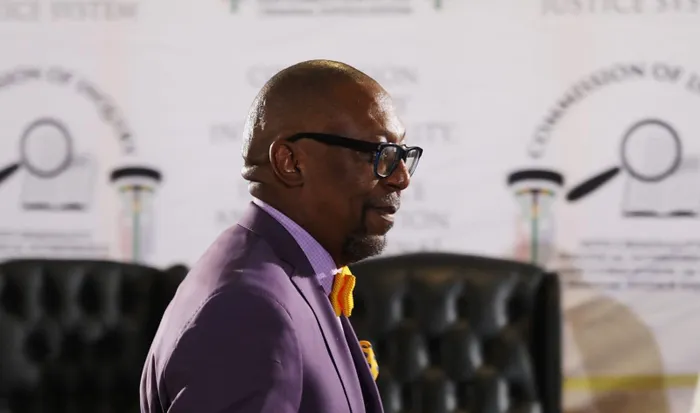
Adv Terry Motau broke silence on why he left the Madlanga Commission.
Image: Timothy Bernard / Independent Newspapers
Legal heavyweight Advocate Terry Motau SC broke his silence on his surprise resignation as chief evidence leader from the Madlanga Commission of Inquiry into Alleged Police Corruption and Criminal Cartels.
Motau’s exit, long shrouded in speculation, comes just days after the commission announced a temporary pause in proceedings due to the ill health of key witness Lt-Gen Dumisani Khumalo.
Dispelling rumours of an abrupt departure in an interview with Radio 702 on Thursday, Motau revealed that he had tendered his resignation on September 11, after what he described as “prolonged to-ing and fro-ing” with commission leadership.
His decision, he stressed, was neither sudden nor emotional — but rooted in deep structural and administrative misgivings.
“Things did not go according to plan. There were unforeseen issues on my part that made it impossible for me to add value to the Commission,” Motau said.
Central to his concerns was the lack of budget clarity — a lesson, he pointed out, that should have been learned from the Zondo Commission, which ballooned past R1 billion in cost, and left several legal professionals unpaid in its final months.
Government announced a R147 million budget, for a task of this magnitude, it’s not much, said Motau.
“Without clear budget line items, you cannot responsibly allocate tasks or avoid previous missteps.”
Motau was quick to clarify that his resignation was not about money.
“Taking up this role was an act of service. I took a massive pay cut — willingly. I call these matters ‘love for country’ issues,” he said.
Asked pointedly whether he felt undermined within the Commission structure, Motau remained measured but firm, reiterating that a lack of operational transparency compromised his ability to lead effectively.
“When you come on board to offer your expertise, and you can’t get answers on basics like task allocation or budget usage, it becomes a concern,” he explained.
Motau’s departure has raised broader questions about the Commission’s ability to deliver on its ambitious mandate within President Cyril Ramaphosa’s promised timeline.
While expressing confidence in those remaining, Motau warned that unresolved administrative cracks could compromise outcomes — much like in previous inquiries.
“My hope is that my resignation highlights how serious these issues are. This Commission is vital to restoring public trust in the criminal justice system.”
On the revelations heard so far, Motau admitted that the testimony, though still untested by cross-examination, was deeply disturbing.
“The connections and tentacles revealed so far are shocking. But as I said from the outset — it’s not about what is said; it’s about what can be proven.”
Despite his resignation, Motau remained supportive of the Commission’s mission, hopeful that its work, if properly supported, will lead to credible outcomes and prosecutions.
“I came into this with confidence, and I still believe, if evidence is backed and institutions respond, the Commission can help this country turn a corner.”
kamogelo.moichela@iol.co.za
IOL Politics